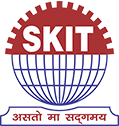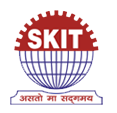Teaching Learning Methodology
Defining Innovation in Teaching and Learning
The term “Innovation” in teaching and learning is intrinsically quite broad in perspective and there are a number of views on how to define it. In the department of Electrical Engineering of SKIT-Jaipur, we define it as follows:
“Any teaching strategy, approach, technique, or tool can qualify to be termed as an innovation if it is used to produce a quantifiable gain for student outcomes or the student experience, and can be implemented widely”
Many of such innovative initiatives taken by faculty and staff members of the Electrical department can be observed in the Course Files, Laboratory Manuals and other documents that are well maintained in the department. Moreover, the availability of ‘DSpace’ in the institute has rendered the three most important tasks related to the establishment of innovative practices namely recording, reviewing and critique, highly effective.
Statement of goals for innovations in teaching and learning
Realizing the necessity of innovative ideas in the teaching-learning process, and their subsequent implementation through quantifiable initiatives, the following goals have been set:
Apart from the standard teaching-learning experience imparted in classrooms, the department will continuously strive to:
- Enrich the learning experience of students through innovative tools and techniques in laboratories.
- Enhance the understanding and knowledge of students with innovative tools and techniques.
- Broaden the perspective of students in matters pertaining to academic, contemporary as well as social issues using innovative tools and techniques.
- Motivate the students to think, formulate and act innovatively themselves.
List of innovative initiatives in teaching and learning process taken by the Department
Innovation is literally done by each dedicated faculty, knowingly or unknowingly; literally every single working day of his/her career. Some initiatives may be so small to escape attention and might be difficult to quantify and record, but may affect the learning of students in a subtle but important way. On the other hand, some initiatives might be so impactful so as to be clearly visible as making huge strides in improving the teaching-learning process. Given below is a listing of some of the noticeable initiatives taken by the faculty of the department. However, it should not be construed as a conclusive list; but as a part of an open-ended process of continuous improvement.
- DSpace submissions: The faculty of the department regularly upload a lot of academically relevant documents on the DSpace repository of SKIT. The portal is directly accessible from the institutional website: http://203.190.148.228:8080/xmlui/handle/123456789/29. The submissions include PowerPoint presentations, articles, lecture notes, lab manuals and many other useful documents that are beneficial for the students.
- Club activities: There is one club that is currently being run by the Department of Electrical Engineering:
- IE Student Chapter: Various technical and non-technical club activities in this club act as excellent grounds for innovative learning. In this club, the faculty are not the only disseminators of knowledge; senior students (older club members) pass on their knowledge and learning to the younger generation (new club entrants) via a continuous ritual-like process, which includes hands-on training, presentations, lectures, group discussions and many other innovative procedures. The clubs with their club activities literally act as the most fertile grounds for innovations in the teaching-learning process.
- Virtual labs: In certain labs, some relevant experiments are conducted online on web browsers with the help of simulators. Such online facilities are called as virtual labs (http://www.vlab.co.in/), and are a part of an excellent innovative initiative taken by the MHRD of India.
- MOOCS: MOOCS or Massive open online courses are a relatively new entry in the academic sector throughout the world. Although the role of MOOCs in the effective dissemination of knowledge is still under debate, they are speedily gaining unquestioned acceptance in more and more academic circles as an innovative means of imparting additional knowledge to students. Here at SKIT, we support augmenting our own efforts of effective delivery by MOOCs available through agencies like NPTEL and SWAYAM.
- Group leaders in lab sessions: This initiative has proved to be highly effective in lab sessions. A group leader is selected for each group working on an experiment in each lab session. The group leader is made responsible for all the outcomes of the lab session of that particular day. Every week in the lab, the group leader is changed so as to pass the responsibility to each student by the end of the semester. This inculcates leadership and responsibility in students.
- Miniature scale models: In many relevant subjects, the faculty encourages the students to make miniature working models of mechanisms. Thus, enhancing interest and level of learning.
- Powerpoint presentations: Use of this widely accepted technique is done wherever deemed necessary in the department. This has actually become a standard norm in the teaching-learning process and is facilitated by the fact that all our classrooms are well-equipped with high-quality projectors ready for use at any time.
- Additional effort for weak students: Students unable to score well in the term exams are identified and are given more attention by faculty. In many cases, they are tasked with additional assignments to enhance their understanding of their respective subjects.
- Quiz tests: Apart from the two mid-term tests (prescribed as a standard); students are required to face two additional quiz tests (covering the half syllabus) for each laboratory. These quiz tests are developed in the format of common competitive tests (objective tests) to prepare the students for such future exams.
- E-mail correspondence with students: Faculty frequently engages in e-mail correspondence with the students to share notes, remarks, assignments and test results. This significantly boosts the out-of-class learning experience of students.
- Student presentations: In many relevant subjects, students deliver presentations to the rest of their classmates. This significantly boosts students’ confidence and their learning experience.
- Audio-visual learning: In many subjects (wherever necessary) audio-visual aids are used. It is a proven fact that audio-visual presentations in classrooms are more effective in capturing the attention of students.
- Adherence to Bloom’s taxonomy: The mid-term tests for all subjects in the department are made in strict adherence to Bloom’s taxonomy. This ensures that the learning, as well as the assessment mechanism, is based on standard practices of the academic fraternity worldwide.
- Personal counseling: This has helped many students in dealing with academic as well as personal problems in the department. Every faculty in the department acts as a counselor to any student with any problem he/she is willing to share.
- Library assignments: Students are set such assignments from time to time; wherein they are required to research certain topics from the resources available in the institute library and finally submit a report.
- Spoken Tutorials for skill development: The dept. conducts spoken tutorial certified courses by collaborating with IIT Bombay for enhancing coding skills in Python, C++, Java etc.
- Simulation based learning for theoretical concepts and use of latest tools: The students are encouraged for simulation-based learning on software’s like MATLAB/Simulink/ PSCAD/ PWSto simulate and analyse systems for a better understanding of the subject. Demonstrative simulation models are also uploaded on the Institute repository for use and further development by the students.
- Project based learning: Students are encouraged to work in the various domains of EE like Electric Vehicles, Renewable Energy, Artificial Intelligence, Embedded Systems, IOT etc.
- Publication in Conferences/Journal of International Repute: The faculty members and students are actively participating/presenting papers in national/international conferences/journals.
- Development of E-Content: To prepare against challenges towards digitalisation in education especially, it has become an essential need to prepare, Evolve and implement a suitable e-learning. Regarding this, faculty members of department developed standard e-content (lecture recordings) for courses taught in different semesters especially during COVID pandemic. These contents which are created by using three Digital Studios named as electronic Smart Learning And Teaching Environment” (e-SLATE).More than 450 lectures are recorded till now by faculty members of department.
- Incubation Centre: The Institute has established an ecosystem for innovation for advanced research, entrepreneur, and start-Ups. Techno SKIT Incubation Centre (SRIJAN) has been established in 2016.
- Faculty Participation in FDPs, STTPs, and Workshop etc.: The faculty members are encouraged to participate in short term courses, webinar, staff development programs and workshops on advanced topics to keep pace with the advanced level of knowledge and skills. Also, faculty Development Programme, STTPs, Workshops, and Hands on Training are regularly organised by department to enhance the teaching skills of the faculties.
- Interaction with Alumni: The alumni are being invited to participate in national/international seminars/conferences/guest lectures to establish communication with students to share their life experience and give them tips for becoming successful.
- Industrial Visits: To provide students an insight regarding internal working of companies industrial visits are regularly organized for students.
- Interactive learning tools like google classrooms, Cisco Webex and google forms are utilized for taking quizzes and assignments.





